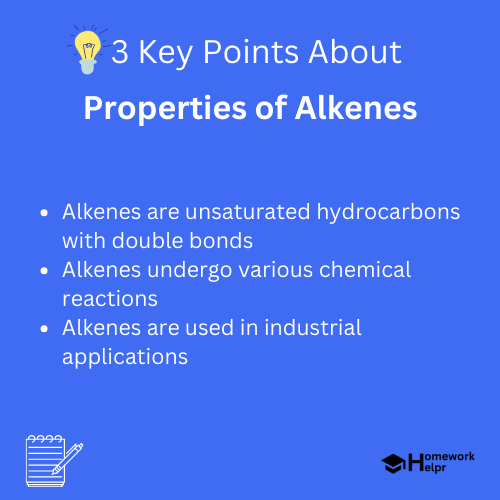📝 Summary
Alkenes are a group of unsaturated hydrocarbons characterized by at least one carbon-carbon double bond, giving them distinct physical and chemical properties. They typically exist as gases or liquids at room temperature, with increasing boiling and melting points as carbon atoms rise. Their reactivity stems from the double bond, allowing participation in various reactions such as addition and polymerization. Alkenes have important applications in making pesticides, plastics, fuels, and pharmaceuticals, making their understanding critical in chemistry. They set the foundation for more complex organic compounds and reactions.
Properties of Alkenes
Alkenes are a group of unsaturated hydrocarbons that contain at least one carbon-carbon double bond. This unique feature grants them distinct physical and chemical properties that differentiate them from their saturated counterparts, which include alkanes. In this article, we will delve into various aspects of alkenes, including their physical properties, chemical properties, and some real-world applications.
Physical Properties of Alkenes
Alkenes possess several notable physical properties that are influenced by their molecular structure and the presence of the double bond. Key characteristics include:
- State at Room Temperature: Alkenes are typically gases or liquids at room temperature, depending on their molecular weight. For example, ethylene (C2H4) is a gas, while octene (C8H16) is a liquid.
- Boiling and Melting Points: The melting and boiling points of alkenes generally increase as the number of carbon atoms increases. This increase is due to the rising van der Waals forces between larger molecules.
- Density: Alkenes are generally less dense than water, which means they will float when mixed with it. For instance, butylene (C4H8) has a density of 0.62 g/cm³.
- Solubility: Alkenes have low solubility in water due to their non-polar nature. However, they are soluble in organic solvents, making them useful for various industrial applications.

Chemical Properties of Alkenes
Chemically, alkenes are remarkably reactive due to the presence of the double bond between carbon atoms. This reactivity allows them to undergo a variety of reactions that are fundamental to organic chemistry. They can participate in:
- Addition Reactions: In these reactions, alkenes react with adding reagents across the double bond. For example, when hydrogen (H2) is added to ethylene, it converts to ethane.
- Polymerization: Alkenes can form long chains known as polymers through a process of addition reaction. A prime example is polyethylene, formed by polymerizing ethylene.
- Oxidation: Alkenes can react with strong oxidizers like potassium permanganate (KMnO4) to form diols or carboxylic acids.
- Halogenation: Alkenes react with halogens such as chlorine or bromine in a straightforward manner to form dihalides, which are often useful in various applications.
Definition
Addition Reactions: Chemical reactions where new atoms are added to a molecule without the loss of any atoms. Polymerization: A process that combines small molecules called monomers into large structures known as polymers.
Examples
An example of an addition reaction is the reaction of propene with bromine, which yields 1,2-dibromopropane.
❓Did You Know?
Did you know that the simplest alkene, ethylene, was first recognized as a plant hormone? It plays a crucial role in the ripening of fruits!
Reactivity and Applications
The unique reactivity of alkenes leads to their extensive use in various applications. Here are a few notable uses of alkenes in different industries:
- Pesticides and Herbicides: Many alkenes are synthesized to create pesticides and herbicides, which help protect crops from pests and diseases. For example, the herbicide alachlor contains an alkene in its structure.
- Plastic Production: Alkenes, particularly ethylene and propylene, are critical in producing various plastics, including polyethylene and polypropylene.
- Fuels: Some alkenes are used in fuel formulations that increase efficiency and reduce environmental impact.
- Pharmaceuticals: Alkenes are vital building blocks in creating numerous pharmaceuticals. Complex molecules often utilize alkenes in their synthesis.
Conclusion
In summary, alkenes are an essential class of hydrocarbons with unique properties arising from their unsaturated nature. Their physical properties, such as state, boiling and melting points, and solubility, inform their behavior in various settings. Furthermore, their chemical properties make them react readily with various reagents, leading to important applications ranging from agriculture to plastics and pharmaceuticals.
Understanding the properties of alkenes is crucial for students of chemistry as it lays the foundation for comprehending more complex organic compounds and their reactions. Knowledge of alkenes also encourages critical thinking and enhances problem-solving skills in scientific contexts.
Related Questions on Properties of Alkenes
What are alkenes?
Answer: Alkenes are unsaturated hydrocarbons with double bonds.
Why are alkenes important in industry?
Answer: They are used in plastics, fuels, and pesticides.
What are the physical states of alkenes at room temperature?
Answer: Alkenes can be gases or liquids at room temperature.
What reactions do alkenes primarily undergo?
Answer: Alkenes primarily undergo addition and polymerization reactions.
